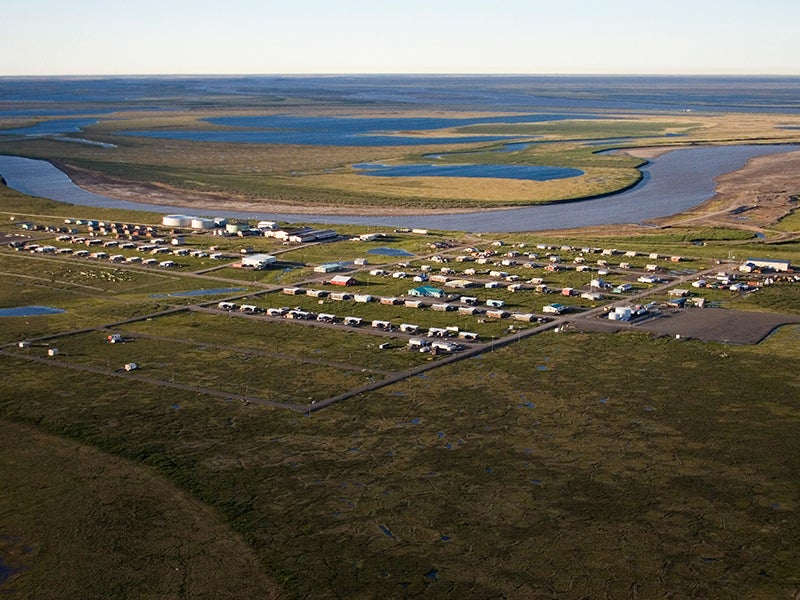Earthjustice stands with western Alaska tribes and families after severe storms devastated entire communities, displacing more than 1,000 residents just before winter. Learn more and how you can help.
Native Village, Conservation Groups Challenge Winter Oil, Gas Drilling in Western Arctic
Lawsuit targets cursory federal assessment of ConocoPhillips’ plan for drilling in Alaska petroleum reserve
Contact
The Native Village of Nuiqsut tribal government and five conservation groups today challenged the Bureau of Land Management’s approval of ConocoPhillips’ winter exploratory drilling program in the National Petroleum Reserve-Alaska, America’s single largest area of public lands. Earthjustice filed the lawsuit in federal court on behalf of the Native Village and other clients. ConocoPhillips’ exploration would involve construction of nearly 70 miles of ice roads and up to 23 ice pads along with the drilling of six new exploratory wells in the federal Reserve immediately adjacent to the community of Nuiqsut.
BLM officials signed off on the drilling program late last year without preparing an environmental impact statement. This drilling program significantly expands industrial activity in and around the Teshekpuk Lake Special Area, identified by Congress for maximum protection because it includes some of the most important migratory bird habitat in the world and is home to the Teshekpuk Caribou Herd.
This herd has long been an important part of the culture and economy for the Iñupiat people of Nuiqsut. Indigenous subsistence hunting is vital to the village of Nuiqsut, where for generations hunters have tracked and hunted caribou, which range in the tens of thousands in the Teshekpuk Lake Special Area. But the herd has declined 40 percent over the past decade, as industrial activity has intruded into its range.
“The Fish Creek area that ConocoPhillips is moving into is our last safe haven for subsistence activities,” said Native Village of Nuiqsut Tribal Secretary Peter Kosbruk.
“Our health is what we eat, and 95 percent of what we eat is from the land, rivers and sea,” said tribal administrator Martha Itta. “There has been little or no consultation with us by either BLM or the company about how things are going to be done. We need everything to slow down so we can understand the impacts of past, current, and future projects so we can adapt to the changes that are altering and affecting our lives in many ways. BLM needs to take the time to understand and address the impacts to the area and our community before it proceeds.”
In the lawsuit, the Native Village of Nuiqsut and conservation group plaintiffs argue that BLM erred in deciding to forego a full environmental impact statement. The conservation groups joining the lawsuit are Alaska Wilderness League, Center for Biological Diversity, Friends of the Earth, Natural Resources Defense Council and Sierra Club.
Ice roads and infrastructure, and their associated vehicular and air traffic, are displacing caribou from their traditional overwintering grounds, which can affect their calving success and survival and harm traditional hunting practices. The Teshekpuk Caribou Herd is the only Alaskan caribou herd that remains in the Arctic over winter, making this herd vulnerable to winter fossil fuel activities.
The people of Nuiqsut are already feeling the growing impacts of the oil and gas activities that surround their community, and ConocoPhillips’ winter drilling plans will only compound these cumulative impacts. Before proceeding, BLM failed to do the required assessment of all these effects or to consider any options for reducing impacts.
“Caribou have always wintered around the northern coastal area,” said Itta. “They travel between here and the Anaktuvuk Pass. It used to be by the thousands and thousands. The infrastructure is changing their migration route, interrupting it.”
The exploratory drilling program is forcing hunters and trappers to travel further and making it more difficult to pass on traditional hunting practices to their children. As part of its massive oil program, ConocoPhillips is also operating gravel mines around Nuiqsut. “These industrial operations are resulting in constant blasting and truck traffic that disrupts our people’s lives and damages homes and sends harmful dust clouds tumbling into the area, all the way to our only drinking water resource,” said Itta.
The conservation groups that joined in this lawsuit issued a joint statement:
“The Reserve is a globally important ecological resource, home to caribou, bears, muskoxen and millions of migratory birds. And the Reserve’s Teshekpuk Lake Special Area is a vital environmental, cultural and economic asset for the Native Village of Nuiqsut. The Trump administration acted irresponsibly and illegally by allowing this escalation and intrusion of industrial activity into this area without even the pretense of meaningful analysis of the impacts of this action or consideration of less harmful alternatives. BLM should do its job and follow the law.”
The lawsuit asks the court to rule that BLM’s Finding of No Significant Impact is in violation of the National Environmental Policy Act.

Additional Resources
About Earthjustice
Earthjustice is the premier nonprofit environmental law organization. We wield the power of law and the strength of partnership to protect people's health, to preserve magnificent places and wildlife, to advance clean energy, and to combat climate change. We are here because the earth needs a good lawyer.